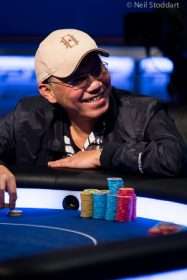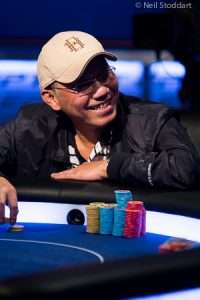US Prosecutors File New Conspiracy Charge Against Paul Phua
Federal prosecutors working from the United States Attorneys Office for the District of Nevada have filed a new charge against Wei Seng “Paul” Phua in an ongoing case involving the operation of an illegal boiler-room sportsbook operation from private Caesars Palace guest villas last summer. In a recent filing, prosecutors added a conspiracy charge against Phua in addition to several existing counts, including the operation of an illegal gambling enterprise and transmission of wagering information.
The filing of the additional conspiracy count by the Nevada USAO appears to be an attempt to circumvent a ruling issued a month ago. US District Judge Andrew P. Gordon ruled in April that much of the evidence amassed against Phua was inadmissible and violated Phua’s Fourth Amendment rights, legal protections which extend to all people within the US who are accused of a crime, not just US citizens.
In the updated complaint, prosecutors have monetized the “criminal forfeiture penalty” they seek from Phua in connection with the case, at $13 million, which represents either the amount of profit prosecutors believe was earned from the boiler room’s illegal operations — less the fines already paid by other defendants — or is the amount of liquid assets in Phua’s name already seized by US agents. Phua’s private jet, variously valued at between $25 and $40 million, has also been seized by US agents and is also subject to forfeiture.
Prosecutors have continually tried to define Phua as the ringleader of the boiler-room operation. That includes the introduction of evidence against Phua that was seized from the two other villas occupied by members of the group, including the one villa where roughly 20 separate guest keys were issued and where a full-fledged online bookmaking operation was indeed in operation. However, US authorities have struggled in vain to tie the operations in that other guest villa back to Phua. The filing of the latest count represents a new attempt by federal prosecutors to argue for the legitimacy of some of the evidence against Phua that has already been ruled inadmissible in connection with the other counts.
The new filing has triggered a fierce volley of court filings between prosecutors and Phua’s prominent Las Vegas defense attorneys. Phua is represented by the celebrity defense firm of Chesnoff and Schonfeld. In speaking to the Las Vegas Review-Journal after the latest count, was filed, David Chesnoff derided the filing.
“A conspiracy charge is the darling of a prosecutor’s nursery,” Chesnoff told the LVRJ. “Mr. Phua maintains his innocence. You cannot be guilty of conspiracy if you never agreed to do anything that’s illegal.”
That statement pales in comparison to some of the accusations launched by Chesnoff regarding the ongoing actions of federal prosecutors and agents in the case, which is scheduled to go to trial on June 1st. In a blistering 20-page response to the government’s motion seeking to reintroduce the previously suppressed evidence, Chesnoff wrote:
“… Put another way, the Government’s position is that the evidence would have been ‘inevitably discovered’ because the agents inevitably would have lied successfully to Magistrate Judge Koppe,” the judge who issued the initial search warrant based on FBI agents’ lies and misrepresentations. Added Chesnoff, “That obviously cannot be the law.”
The extreme measures that federal agents and prosecutors went to in order to construct a case against Paul Phua and seven other original defendants have been well documented in previous updates here at Flushdraw. Federal agents have been shown to have lied to another judge in hopes of getting a search warrant for Phua’s Caesar Palace villa, one of three originally believe to have been part of the illegal sportsbook operation. Then the agents, actively assisted by Caesars Palace staff, constructed a complicated (and deemed inadmissible) ruse in which high-speed Internet access to Phua’s villa was turned off. The agents posed as technicians and pretended to fix the “problem,” while secretly videotaping the interior of Phua’s villa.
Agents and prosecutors also admitted that Phua was the primary target of the investigation into the alleged boiler-room bookmaking opoeration, following the arrest of Phua and roughly two dozen others in Macau last May on a series of similar charges. Phua, who holds a diplomatic passport from the Republic of San Marino in Europe, arrived in Las Vegas soon after his departure, forced or not, from Macau.
The latest filing by Chesnoff also includes a series of points extracted directly from earlier pre-trial battles in the case, describing them as “undisputed facts” that the government has chosen to ignore or minimize in its efforts to undo the earlier evidence suppression. Some samples from the defense filing:
- “The Government reviewed the materials provided by Caesars Palace — including the photographs of supposed ‘boiler room’ in Villa 8888 — and concluded that it could not justify proceeding with an investigation. [] (‘Basically, we got nothing.’) [] (confirming that ‘the board had determined that it did not have — from the materials it had gotten from Caesars, everything it had — the ability to pursue a case.’)
- “Both before and after the unconstitutional searches, the agents and US Attorney’s Office repeatedly expressed concern that they lacked probable cause. [Reference #s for various exhibits and quotes]; ‘need to tighten up the PC [probable cause]’; (‘make whatever changes you believe will solidify the probable cause’); (‘warrant application had not been submitted because ‘AUSA wanted more PCs’.'”)
- “The unconstitutional search on July 5 specifically convinced the agents that they had the evidence they required to seek a warrant. [] (Agent Lopez concludes immediately after leaving Villa 8882, ‘We saw what we needed. Very much.’)”
Whether or not Phua participated materially in the boiler-room operation or was indeed its de facto “ringleader” has, as one can clearly see, become secondary as to whether agents broke the rules themselves in attempting to construct a case. That the agents and prosecutors have considerable monetary incentive to continue the prosecution despite significant evidence indicating misconduct is also evident from the many filings in the case.
Six of the seven other defendants in the US case, including Paul Phua’s son, accepted plea deal and hefty fines to resolve the charges against them. Charges against one other defendant were dismissed. The six defendants who accepted plea deals, all from Asian countries, also accepted a virtual deportation, agreeing not to return to the US for at least five years.





















COMMENTS